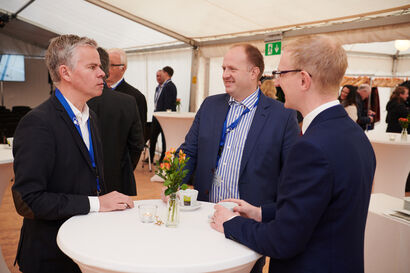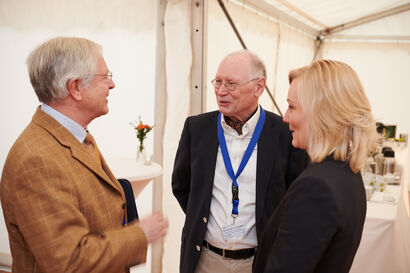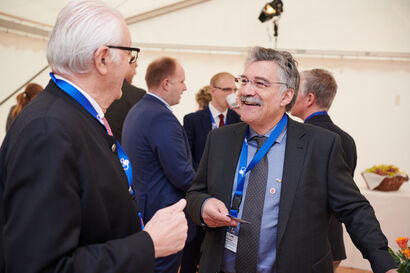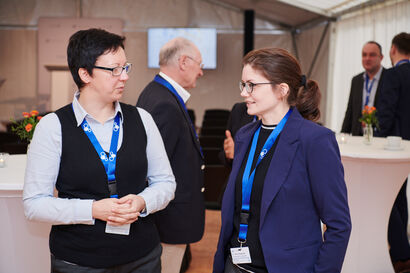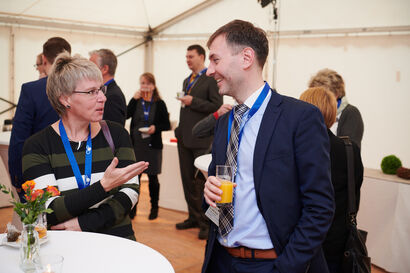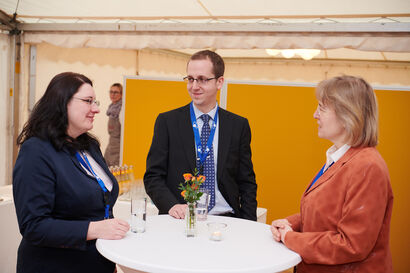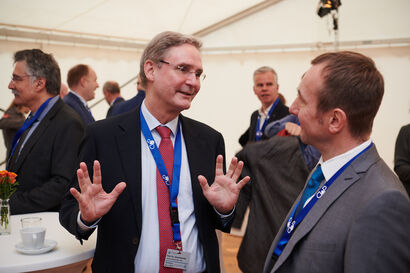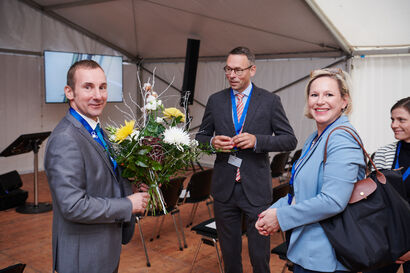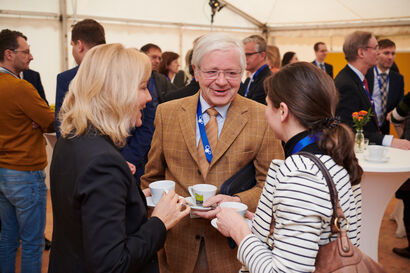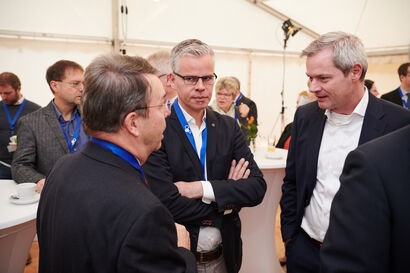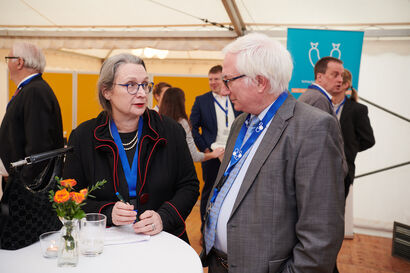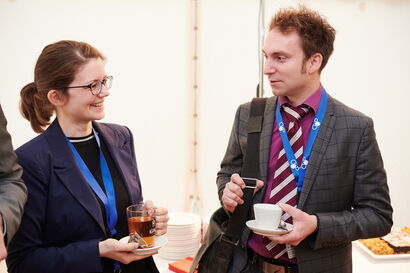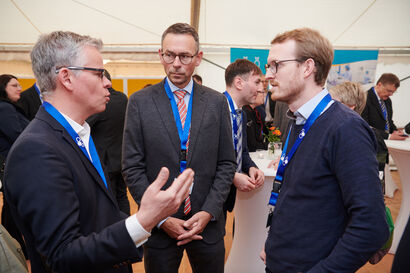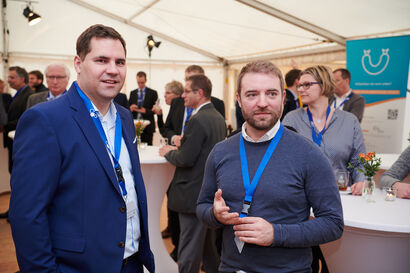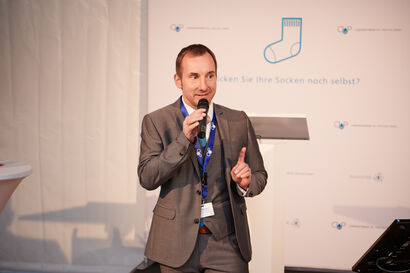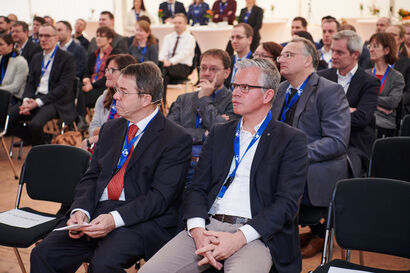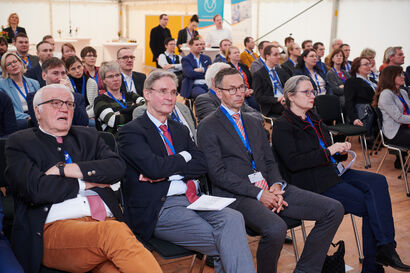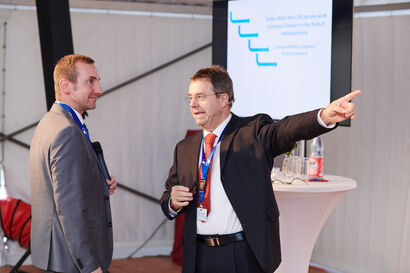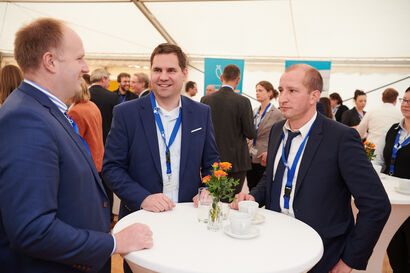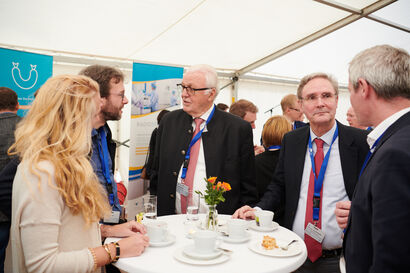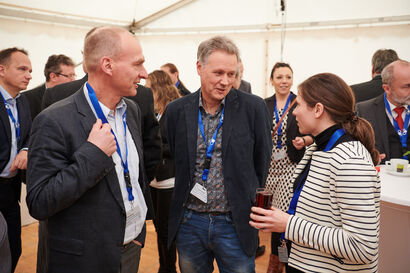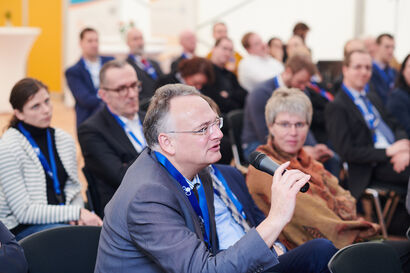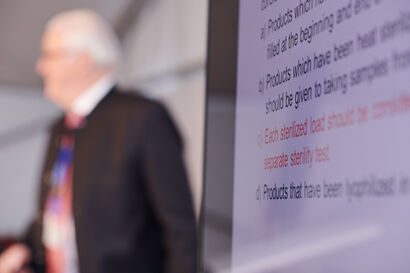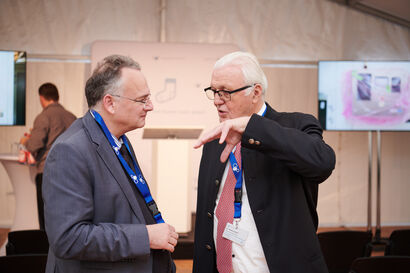RICHTFEST Neubau "RADIOSTER" und
10 Jahre GMP-Analytik am Standort Radeberg
Dienstag, 26.11.2019, 09.30 - ca. 14.30 Uhr


Rückblick
Am 26.11.2019 wurde bei den CUP Laboratorien in Radeberg ein verspätetes Richtfest für ein Projekt eines Erweiterungsbaus gefeiert. In diesem hochmodernen Gebäude sollen ab März 2020 Sterilprüfungen von aktiven Radiopharmazeutika durchgeführt werden.
Gleichzeitig haben die Mitarbeiter der CUP Laboratorien mit Ihren Gästen auf zehn erfolgreiche gemeinsame Jahre GMP-Analytik am Standort Radeberg zurückgeschaut und auch einen Ausblick in die Zukunft gewagt.
Die Veranstaltung wurde geprägt exzellenten Referenten.
Den Anfang machte hier Herr Prof. Dr. Jörg Steinbach, der auf die Entwicklung der Radiopharmazie in Dresden-Rossendorf einging. Außerdem gab Prof. Steinbach den Staffelstab der Leitung des Institutes für radiopharmazeutische Krebsforschung am HZDR symbolisch an Prof. Dr. Klaus Kopka weiter und rief die anwesenden Vertreter aus Industrie, Wissenschaft und Politik zur Errichtung eines „Radiopharmaceutical Valley“ im Großraum Radeberg auf. Dieser Ball wurde sowohl von Prof. Kopka als auch von Jens Junker (geschäftsführender Gesellschafter der ROTOP Pharmaka GmbH aufgenommen). Beide Referenten gingen in Ihren Vorträgen auf das Erfolgsmodell der Kooperation von Wissenschaft und Industrie und die großen Chancen der Radiopharmazie, insbesondere im neuen theragnostischen Bereich, ein.
Der Bundesminister für Gesundheit, Jens Spahn, übermittelte sein Grußwort in Form einer Videobotschaft und Frau Yvonne Olivier überbrachte das Grußwort der sächsischen Staatministerin für Soziales, Barbara Klepsch.
In der Mittagssession beleuchteten Frau Dr. Kati Zierenberg (GSK Biologicals), Dr. Helmut Wolf (HW Pharmaconsulting), Dr. Jakub Šimeček (ITG Garching) und PD Dr. Gerald Reischl (Universitätsklinikum Tübingen) die Themen Sterilherstellung, Sterilprüfungen und Radiopharmazie aus unterschiedlichen Sichtweisen.
Die CUP Laboratorien bedanken sich bei allen Gästen, die insbesondere durch die intensiven und fachübergreifenden Diskussionen in den Vortragspausen, die Veranstaltung zu einem großen Erfolg gemacht haben.
Die Veranstaltung wurde kulinarisch begleitet von Schmidt´s Restaurant & Gourmetcatering.
PROGRAMM
| 08.30 - 09:30 Uhr |
Eintreffen der Gäste |
| 09.30 - 10.45 Uhr |
Begrüßung Aspekte der Entwicklung der Radiopharmazie in Dresden/ Rossendorf Grußwort Grußwort per Video Grußwort der Staatsministerin Barbara Klepsch Gemeinsam Spitze - Chancen für KMUs durch Kooperationen mit Wissenschaft und Partnerunternehmen |
| 10.45 - 11:15 Uhr |
Kaffeepause |
| 11.15 - 13.00 Uhr |
Die Entwicklung von GSK am Standort Dresden Neues zum Annex 1 des EU-GMP-Leitfadens Sollen die 177Lu-Peptide auf Sterilität geprüft werden? Validation of Self-Sealing and Particles for Closed-Vial-Filling of PET Parenteralia |
|
13.00 - |
Mittagessen - Austausch bei Fingerfood von Schmidt´s Restaurant |
Grußwort von Jens Spahn, Bundesminister für Gesundheit
Impressionen zum Neubau "RADIOSTER"
Referenten
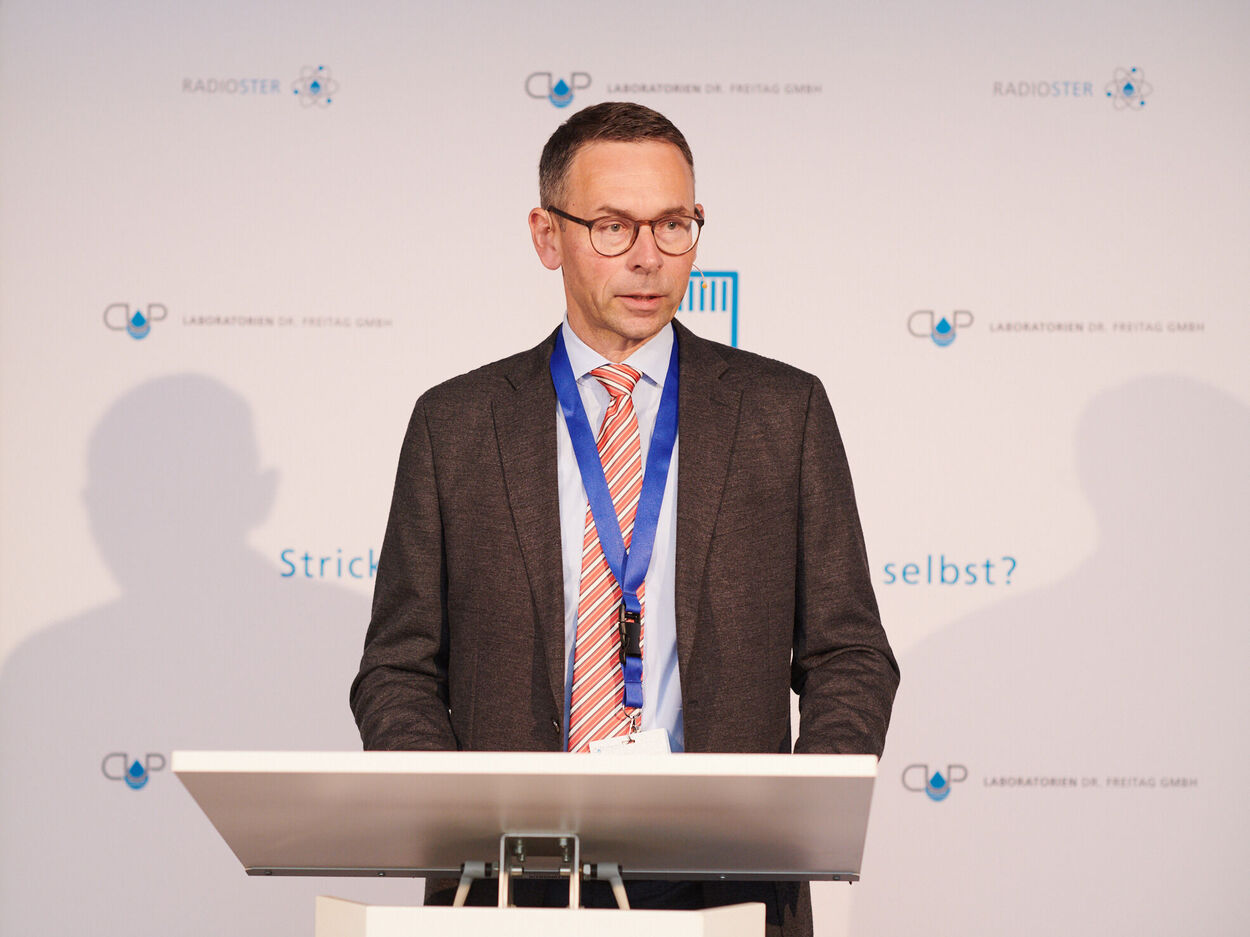
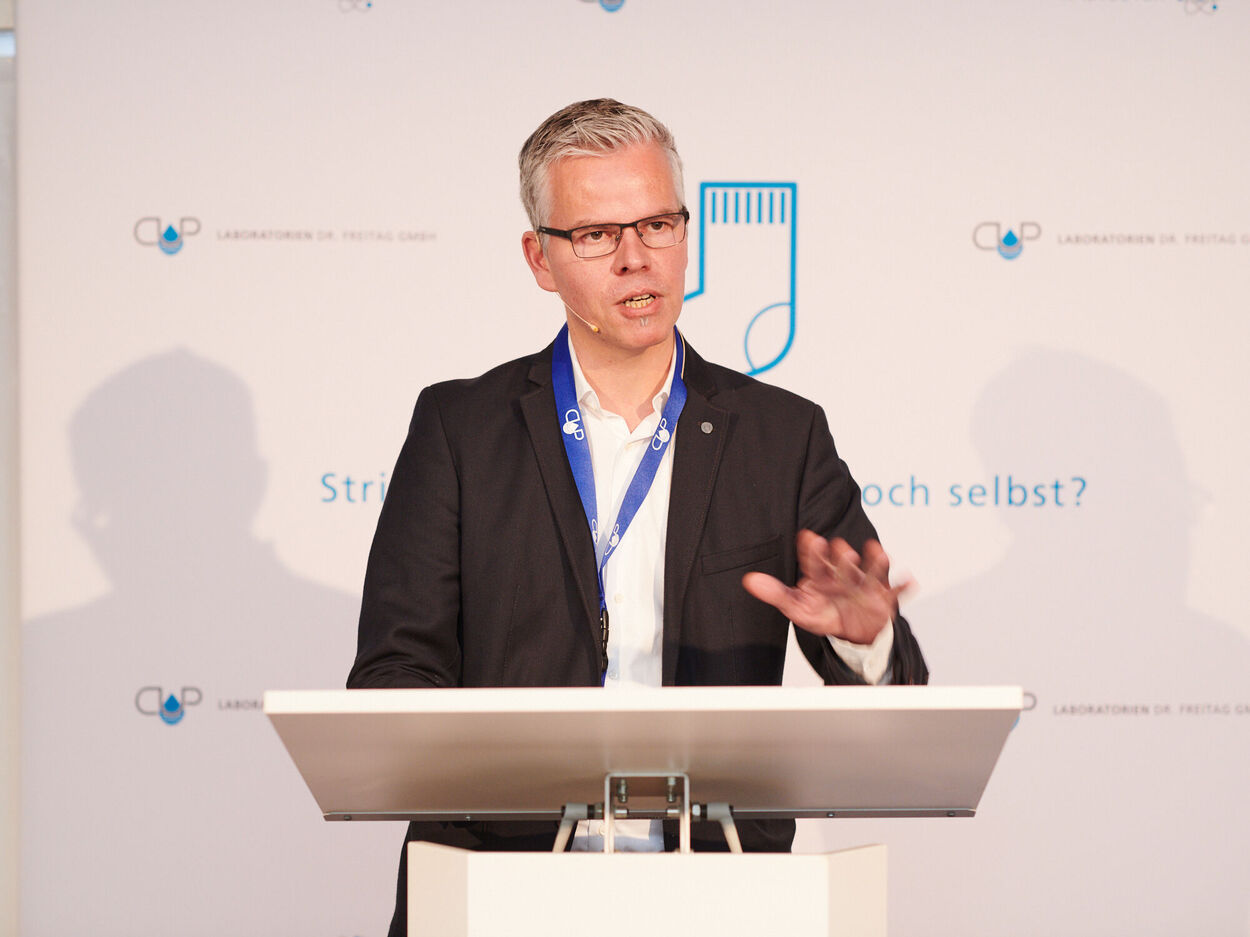
Prof. Dr. Klaus Kopka
Director of the Institute of Radiopharmaceutical Cancer Research @ Helmholtz-Zentrum Dresden-Rossendorf (HZDR)
www.hzdr.deVita
Since the year 2013 Klaus Kopka held a full professorship position at the Ruprecht-Karls-University of Heidelberg, Germany, and was head of the Division of Radiopharmaceutical Chemistry of the German Cancer Research Center [DKFZ], Heidelberg, Germany. In 2019 he has accepted the call on a full professorship for Bioinorganic and Radiopharmaceutical Chemistry at Technical University Dresden [TUD], Germany, which is combined with the directorship of the Institute of Radiopharmaceutical Cancer Research at Helmholtz-Zentrum Dresden-Rossendorf [HZDR].
His current research interests focus on Radiopharmaceutical Sciences with focus on thera(g)nostic radiopharmaceutical drug development which bridges medicinal chemistry on oncologically relevant radiotracers with translational research in nuclear medicine. In the recent years, Klaus Kopka was mainly focused on the development of novel theranostic radiotracers targeting the prostate-specific membrane antigen (PSMA), i.e. PSMA-617 and PSMA-1007. The clinical translation of such highly promising new radiotracers is very important and can only be realised by state-of-the-art GMP-compliant production on-site, which is implemented at HZDR by available hot labs with clean room environment.
Klaus Kopka received his venia legendi (Habilitation) for the field Radiopharmaceutical Chemistry in the year 2007 at the Westfälische Wilhems-University of Münster, Germany. Since the year 2012 he is Chairman of the Working Group Radiochemistry / Radiopharmacy Committee (AGRR) of the German Society of Nuclear Medicine (DGN). The AGRR currently consists of more than 250 members, predominantly scientists from Radiochemistry and Radiopharmacy of Germany, Austria and Switzerland (D-A-CH region). Klaus Kopka was honoured in the year 2018 together with his colleagues Michael Eisenhut, Matthias Eder und Uwe Haberkorn with the highly recognized “The Stifterverband Science Award – Erwin Schrödinger Prize” of the Helmholtz Association of German Research Centres. Klaus Kopka is author and co-author of more than 160 quotable publications (Web of Science) and inventor and co-inventor of more than 10 patents, mainly dealing with the development of new PET tracers and radiopharmaceuticals for non-invasive thera(g)nostics in vivo. He is the radiopharmaceutical coordinator of the ongoing prospective multi-center clinical trial (IIT, phases-I/-II, >150 of 173 patients recruited) within the German Cancer Consortium (DKTK) using [68Ga]Ga-PSMA-11.
At HZDR Klaus Kopka will concentrate on the development and translation of new classes of oncologically relevant radiotracers for early detection and theranostic treatment of cancer.
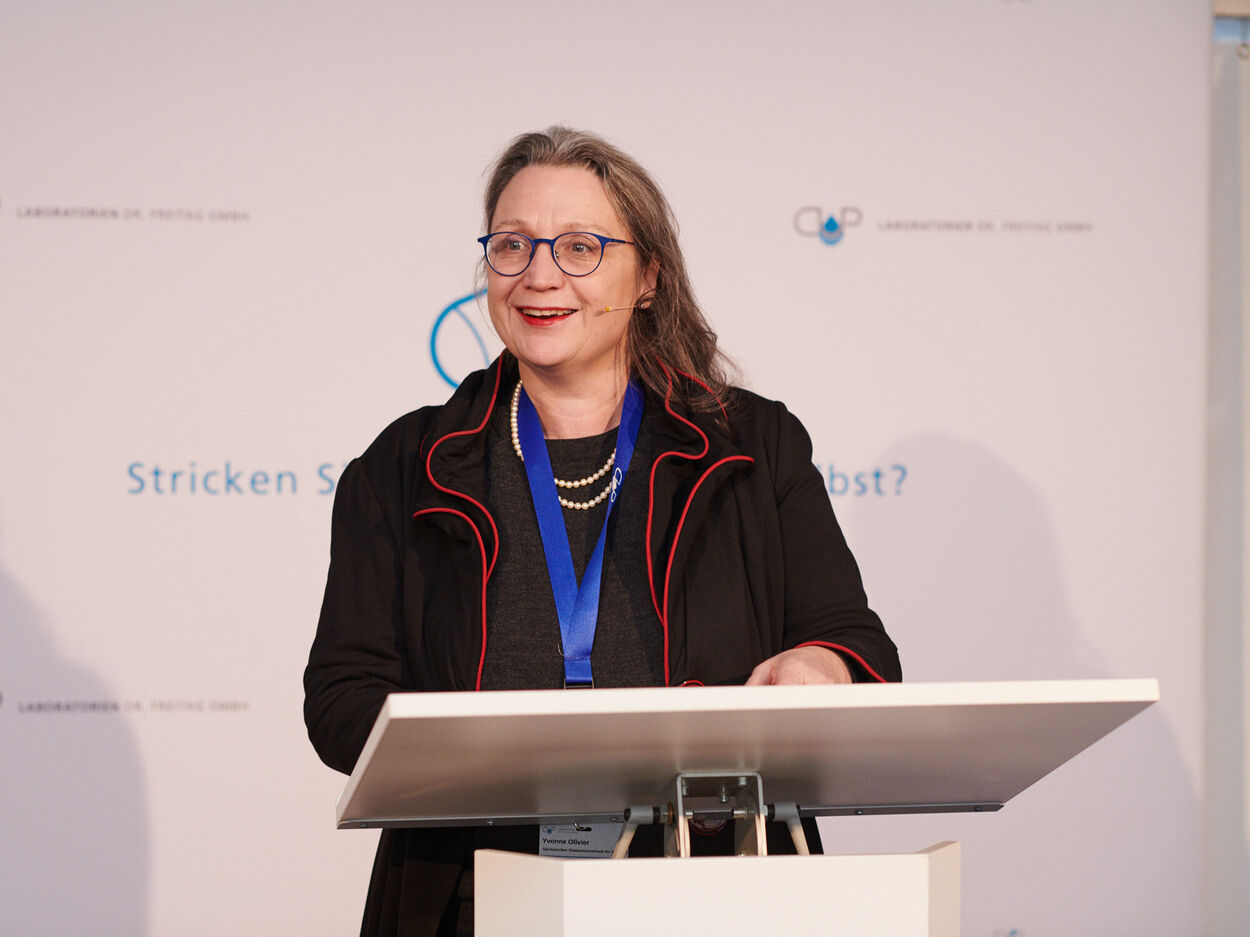
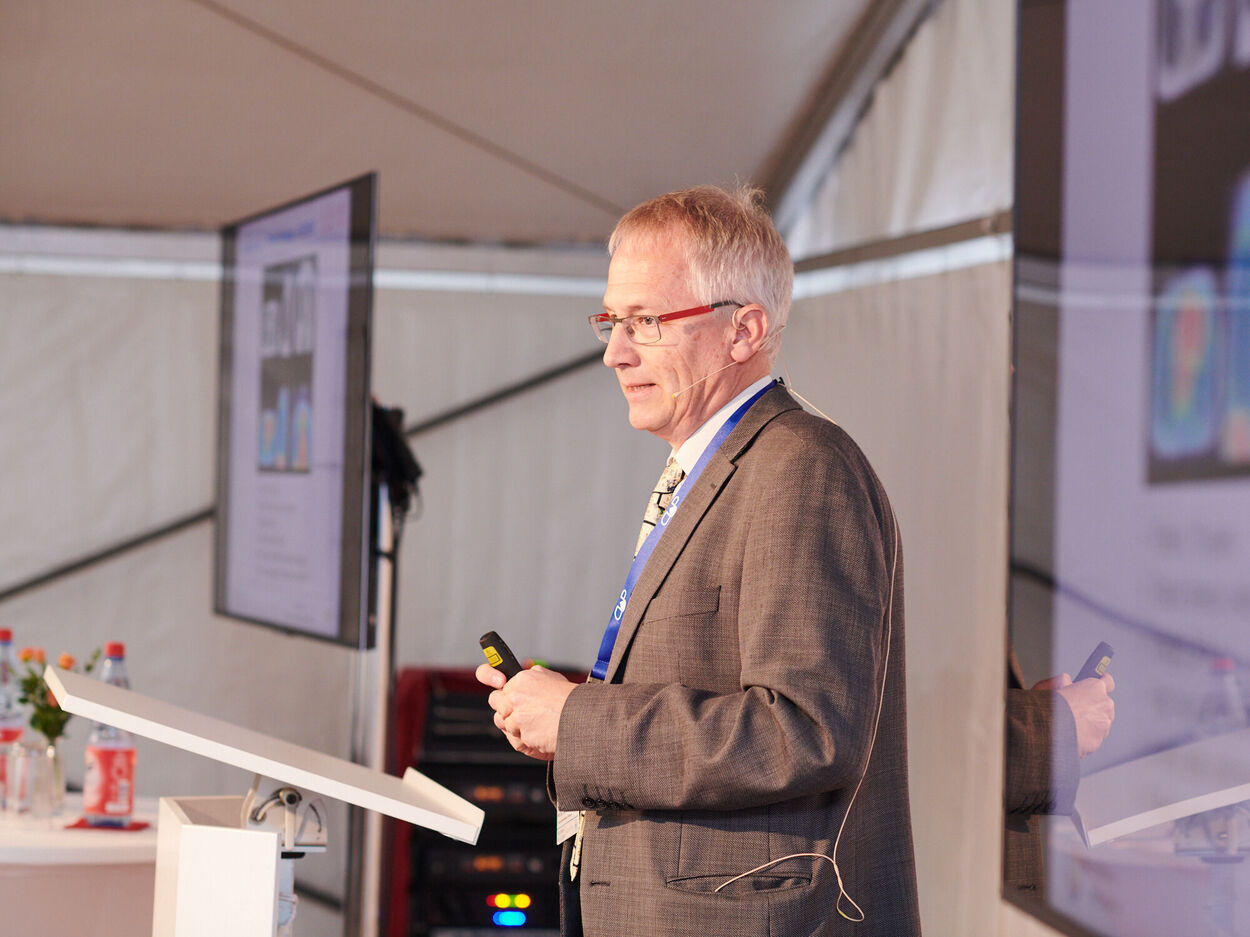
Priv.-Doz. Dr. rer. nat. Dipl. Chem. Gerald Reischl
Bereichsleiter Radiopharmaka-Produktion
Abteilung für Präklinische Bildgebung und Radiopharmazie
Department Radiologie, Universitätsklinikum Tübingen
Vita
Gerald Reischl is Head of the Radiopharmacy within the Department of Preclinical Imaging and Radiopharmacy at the University Hospital of Tübingen (UKT), Germany. After his Ph. D. in Organic Chemistry, he joined the radiopharmacy group of UKT as research fellow in 1996. During a research sabbatical at the Peter MacCallum Cancer Institute, Melbourne, Australia in 2005 he worked on the evaluation of PET hypoxia biomarkers. G. Reischl received the venia legendi (habilitation) in radiopharmaceutical sciences from the Medical Faculty, UKT in 2009. In 2012 an expert mission for IAEA to the Nuclear Research Centre (IPEN) São Paulo, Brazil, followed. Another research visit at the Austin Health, University of Melbourne brought him back to Australia in 2013.
His scientific focus within radiopharmaceutical sciences covers PET isotope production methods, PET tracer development of small molecules and antibodies, imaging of hypoxia / inflammation / infectious diseases, preclinical evaluation and especially translation of new radiotracers under GMP into clinical application. He is author and co-author of more than 100 publications in international peer-reviewed journals. Besides, he has continuously been involved in teaching in radiochemistry and -pharmacy at UKT.
Gerald Reischl is member of the Managing Board of the Consortium “Radiochemistry / Radiopharmacy” within the German Society of Nuclear Medicine (DGN) and chair of the “Consortium Radiopharmacy” of the German Pharmaceutical Society (DPhG). He is part of the Editorial Board of the journal “Applied Radiation and Isotopes” and reviewer for several journals dealing with radiopharmaceutical sciences and nuclear medicine.
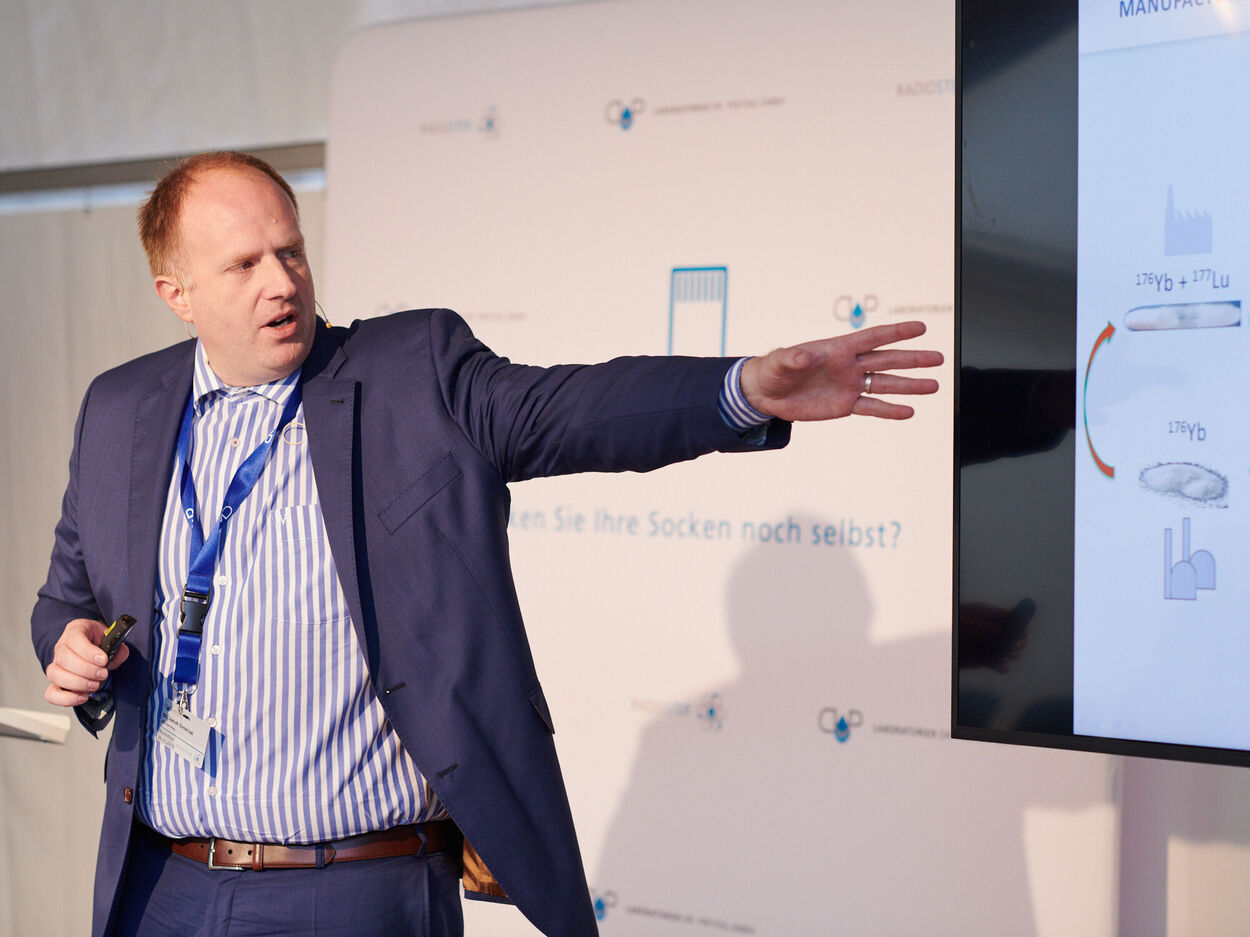
Vita
Jakub Simecek graduated from Charles University in Prague, Faculty of natural sciences, with focus on bioinorganic and coordination chemistry (2010). He obtained doctoral degree at the Technical University in Munich (2014) after conducting pioneering work in the radiometallation field (Ga-68, Cu-64, Lu-177 and Zr-89) followed by bench-to-bedside projects using PET probes predominantly dedicated to nuclear oncology. On the radiotherapeutic field, he co-developed one of the first 177Lu-labelled PSMA inhibitors that are utilised in nuclear medicine practice today. After that he moved to industry dealing with automation in GMP production of PET and therapeutic radiopharmaceuticals and established production of novel nuclear targeting agents in numerous radiopharmacies around the globe. In 2016 he joined Isotope Technologies Garching and worked at different positions, currently as Head of Operational Sales. Recently he has been implementing the preparation of alpha-radiotherapeutics based on Ac-225 in various centers; became a member of European Society for Medical Oncology.
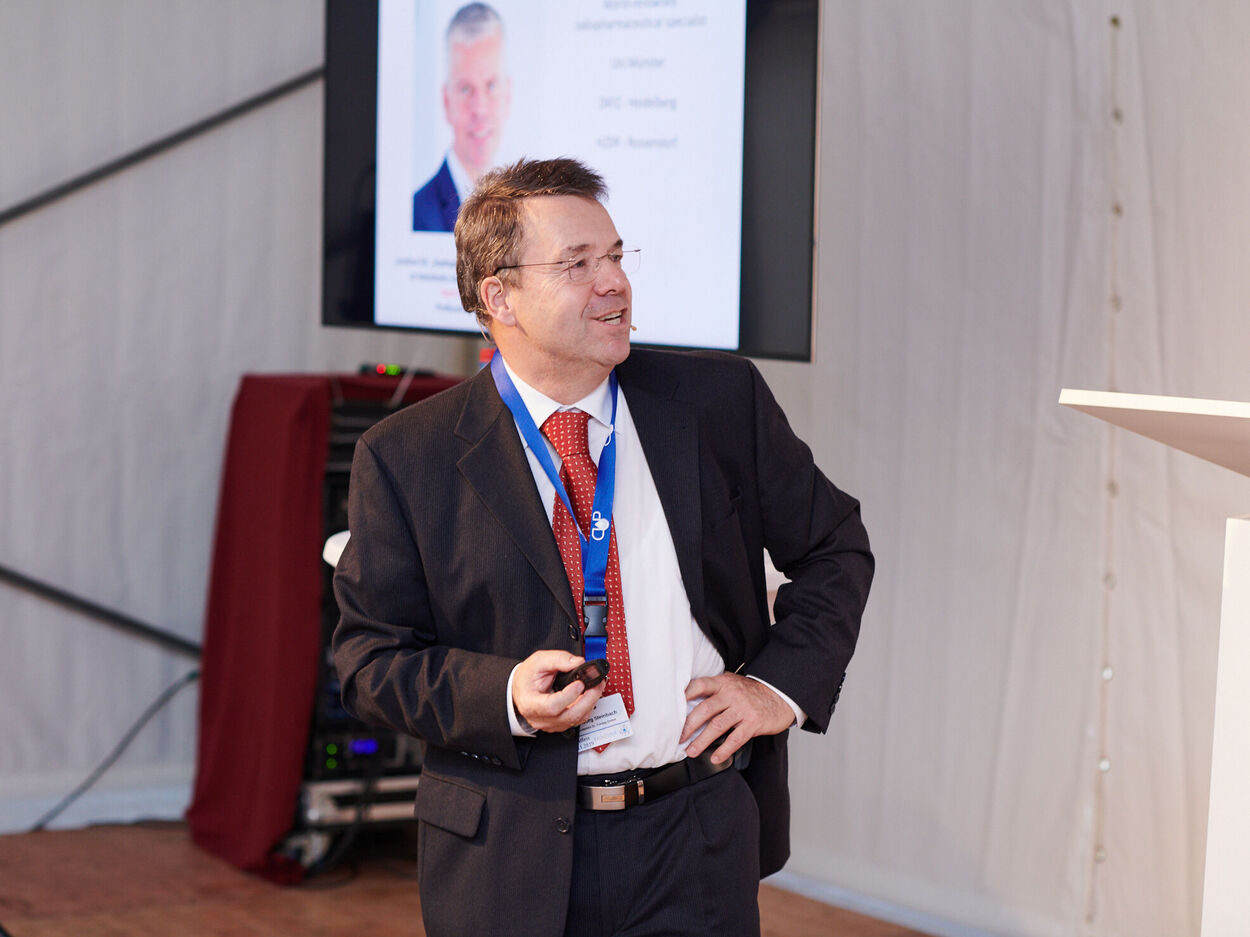
Prof. Dr. Jörg Steinbach
ehemals Helmholtz-Zentrum Dresden-Rossendorf
Vita
• Senior Scientist – Helmholtz-Zentrum Dresden-Rossendorf e.V. Institute of Radiopharmaceutical Cancer Research
• Senior Consultant – ROTOP Radiopharmacy GmbH, Dresden
Research topics:
Radiochemistry and radiopharmacy, Radionuclide production, Targeted radionuclide therapy, Development of new radiotracers and radiopharmaceuticals for imaging of biological functions (Focus: cancer and neurodegenerative diseases)
Scientific Experience:
Radiochemical and radiopharmaceutical developments for Positron Emission Tomography and endoradionuclide therapy, Labelling techniques, Targetry for production of radionuclides
Professional Appointments:
2005 - 2018
Director, Institute of Radiopharmaceutical Cancer Research, Helmholtz-Zentrum Dresden-Rossendorf e.V., Full Professor for Bioinorganic and Radiopharmaceutical Chemistry at Technische Universität Dresden, Lecturer at ETH Zürich, EANM-Course Radiopharmacy
2001- 2009
Director, Institute of Interdisciplinary Isotope Research, Leipzig Full Professor for Isotope Research, Universität Leipzig
1992 – 2001
Head of PET-Department, Institute of Bioinorganic und Radiopharmaceutical Chemistry, Forschungszentrum Dresden- Rossendorf
1982 – 1991
Scientist, Central Institute of Nuclear Research Rossendorf, Department of Radioactive Isotopes
Publications:
More than > 200 scientific publications in peer reviewed journals, contributions to monographs 2006)
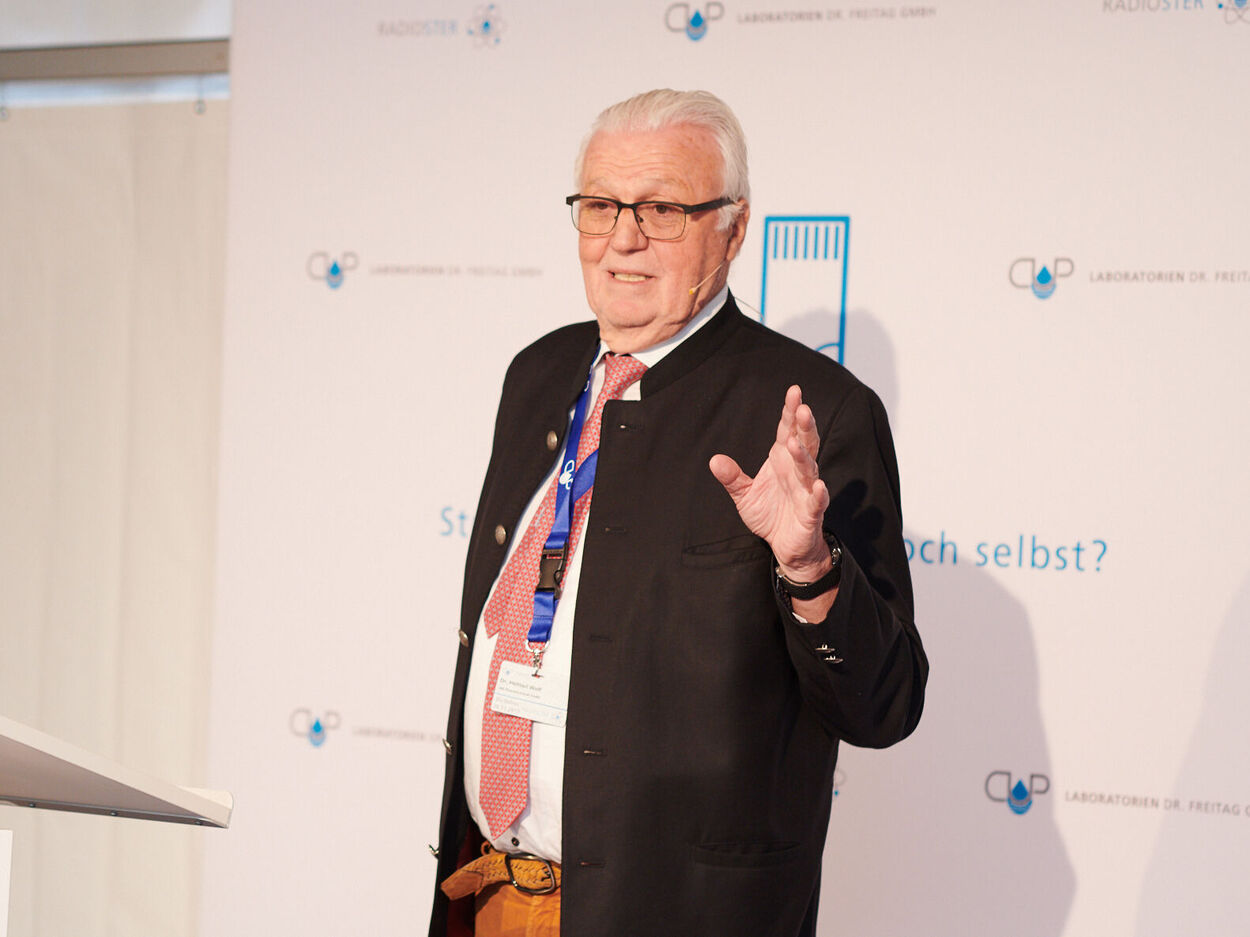
Vita
Dr. Helmut Wolf hat Chemie und Verfahrenstechnik an TU München studiert. Nach dem Studium begann die berufliche Laufbahn bei der Schering AG (heute Bayer) in Berlin. Der Schwerpunkt seines Interesses in der beruflichen Tätigkeit war immer die Entwicklung und Produktion von pharmazeutischen Wirkstoffen und sterilen pharmazeutischen Formulierungen. Während dieser industriellen Tätigkeit übte er verschiedene verantwortliche Leitungsfunktionen in Entwicklung, Produktion, Qualitätskontrolle und Qualitätssicherung bis zu Geschäftsführerfunktionen aus, bevor er sich 1996 selbstständig machte und als Gesellschafter und Geschäftsführer an der Gründung, dem Aufbau und strategischen Fortentwicklung von Neugesellschaften tätig war. Im Laufe seiner beruflichen Laufbahn hatte Dr. Wolf unterschiedliche Verantwortungsfunktionen in Unternehmen aus Deutschland, Frankreich, Italien, Schweiz, Indien, China und USA inne.
Ende August 2019 beendete Dr. Helmut Wolf seine berufliche Vollzeittätigkeit bei dem Lohnhersteller für sterile Formulierungen Lyocontract, Ilsenburg, Sachsen-Anhalt und ist jetzt als freischaffender Berater tätig.
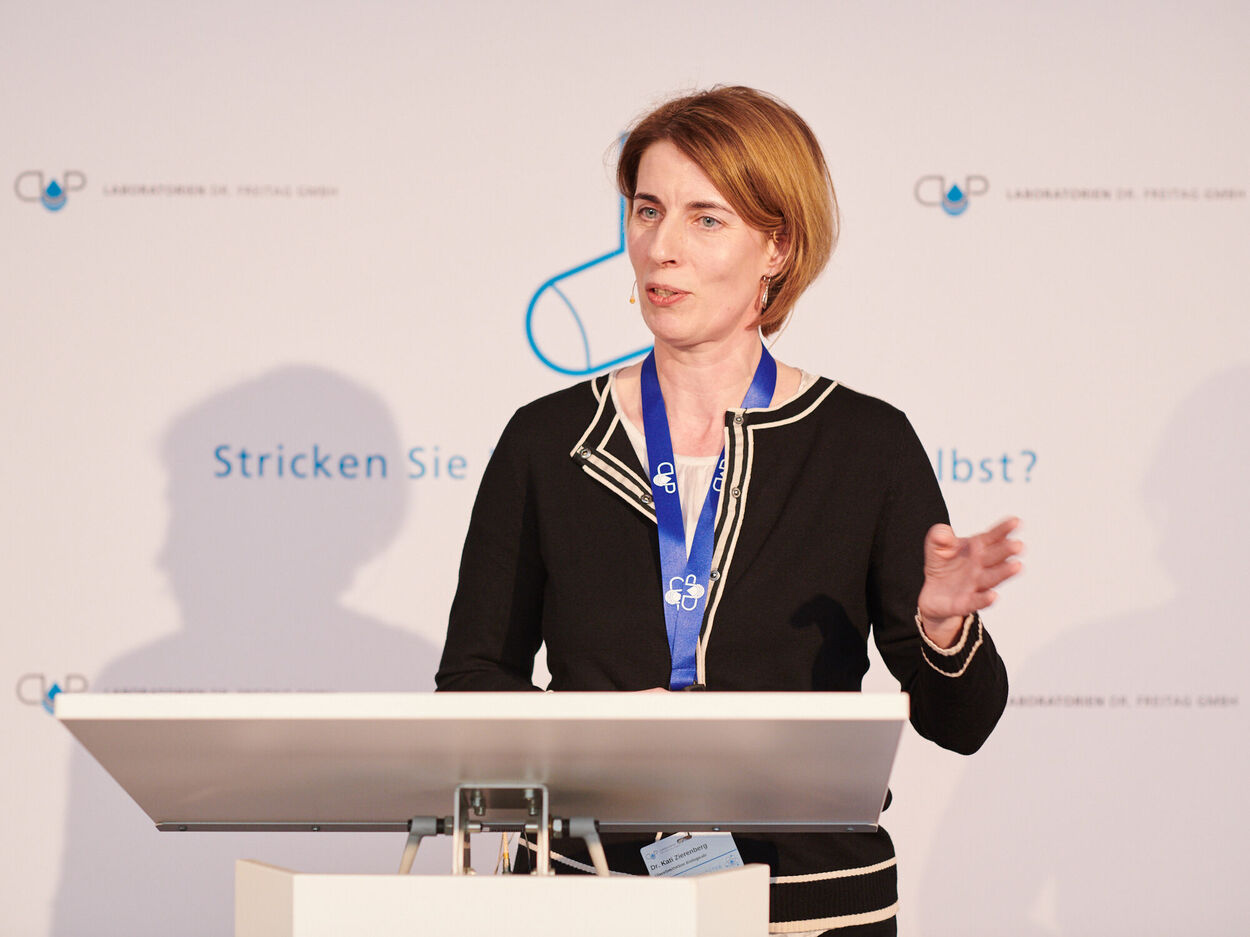
Vita
Dr. Kati Zierenberg ist seit Januar 2017 Site Quality Head am GSK Standort Dresden und übernahm damit die Leitung der aus den Bereichen Quality Assurance (QA) und Quality Control (QC) bestehenden Quality Unit (Q). Eigenständige Quality Units sind im gesamten GSK Vaccines Netzwerk etabliert, um eine starke Partnerschaft zwischen Herstellung und Qualität auf Augenhöhe zu garantieren – im Interesse des Patienten, Impfstoffe in hoher Qualität zuverlässig bereitzustellen.
Dr. Kati Zierenberg ist Tierärztin und hat auf dem Gebiet der Virologie promoviert. Letzteres war der Einstieg in die Pharmaindustrie. Im Jahr 2000 begann sie als wissenschaftliche Mitarbeiterin bei GSK und war in den folgenden Jahren in verschiedenen Funktionen wie Projektleiterin Gentechnik, Leiterin der Prozessentwicklung, Leiterin Virologie und Saatlabor sowie Leiterin Qualitätskontrolle und Entwicklung an der Entwicklung verschiedener Impfstoffe beteiligt.
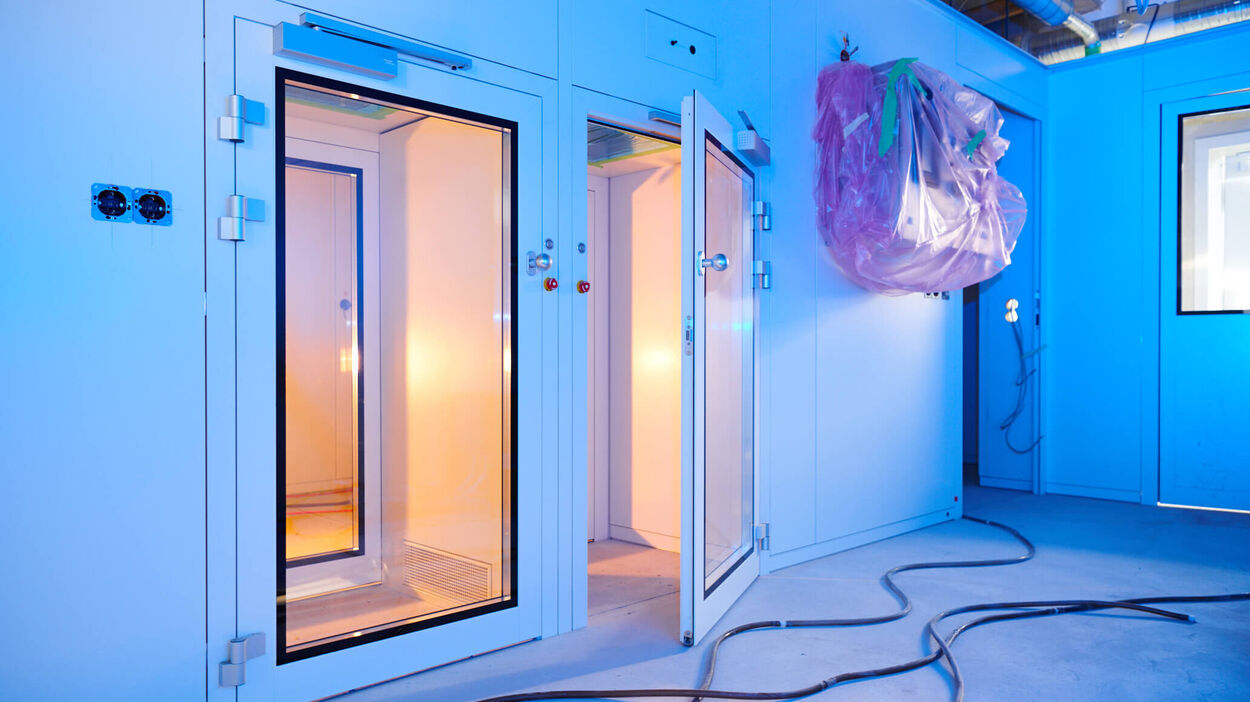
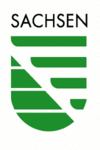
Die Baumaßnahme wird mitfinanziert durch Steuermittel auf der Grundlage des vom Sächsischen Landtag beschlossenen Haushaltes.



